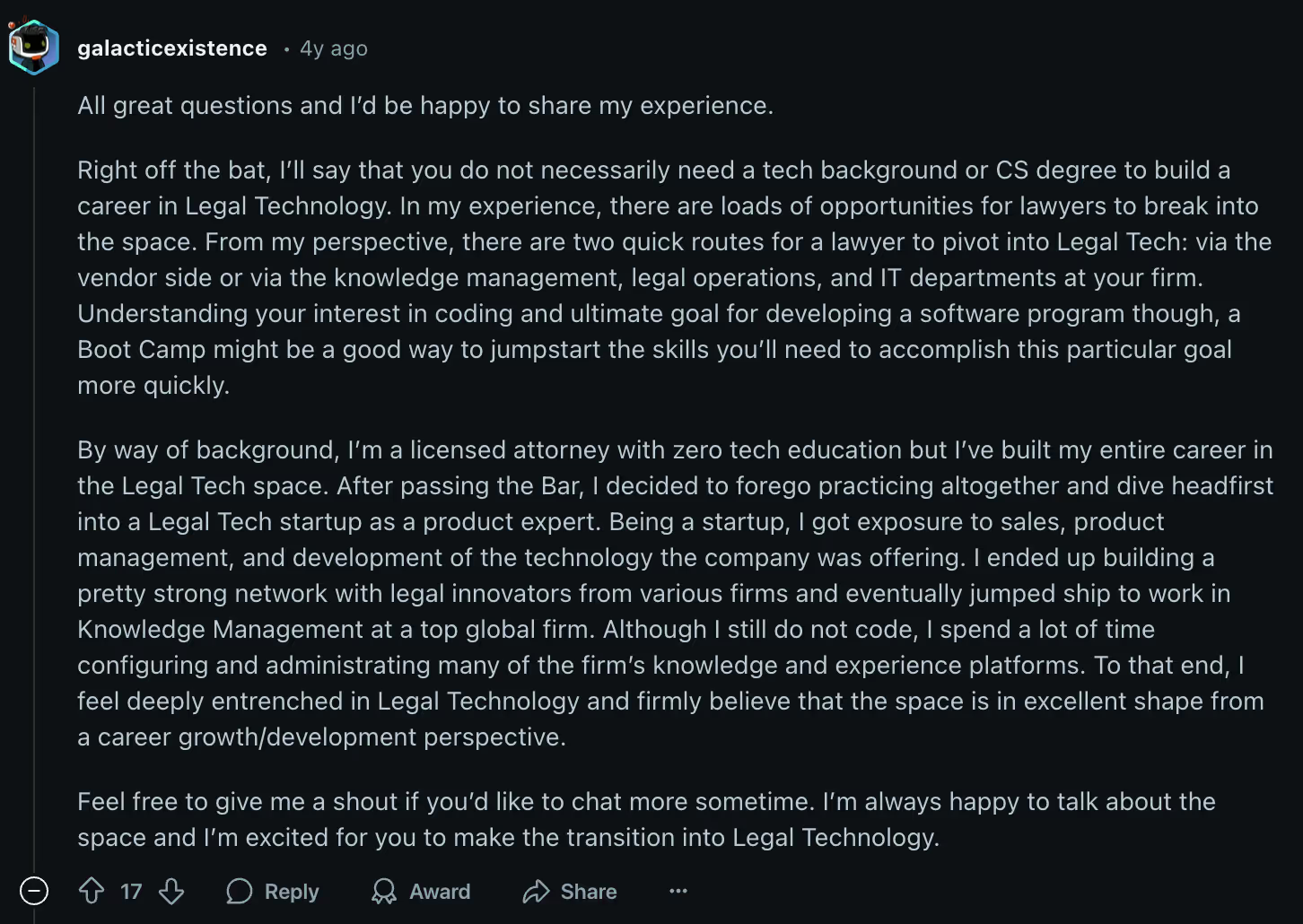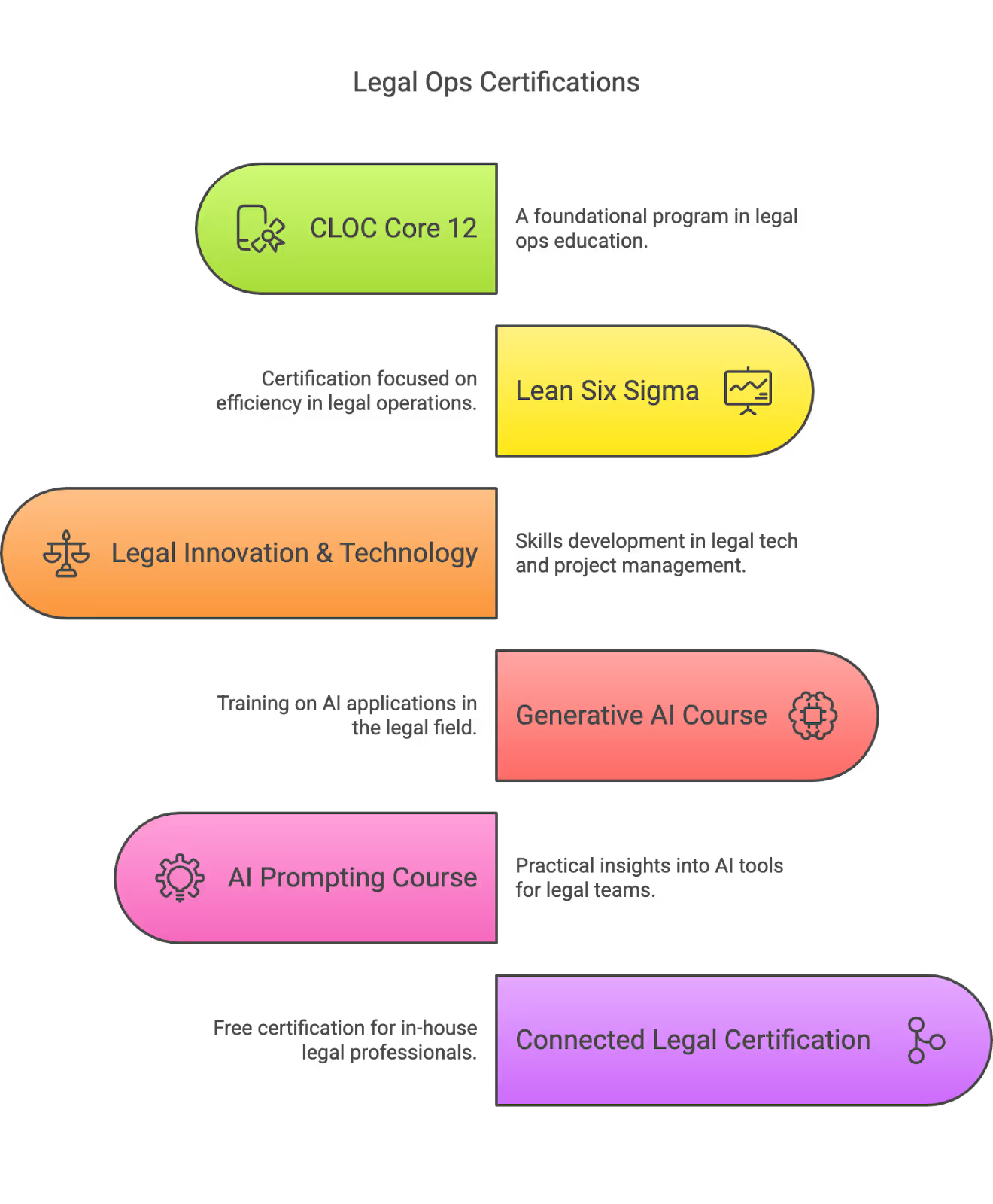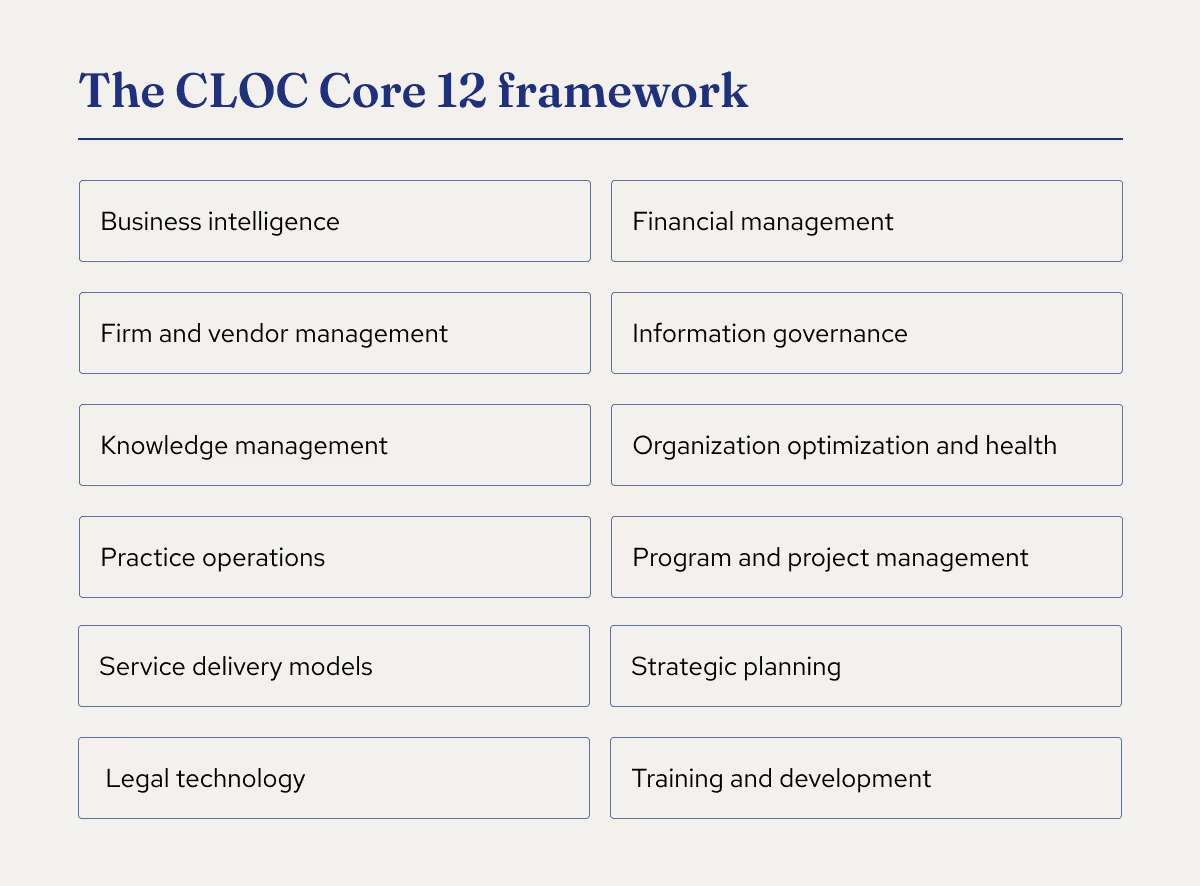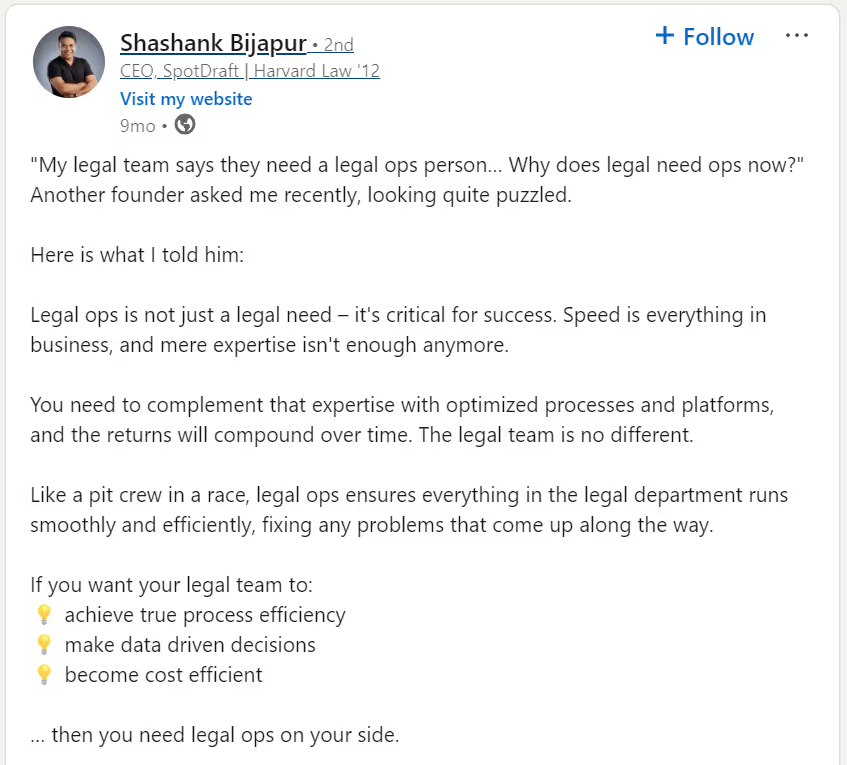TL;DR:
- Legal operations is a rapidly evolving, high-impact role where business meets law and technology
- You don’t need to be a lawyer; a business, finance, or operations background works well
- Essential skills include project management, data analytics, vendor management, communication, and contract lifecycle management
- Getting certified, especially through CLOC Core 12 or Lean Six Sigma, significantly boosts your profile
- Target startups and growth-stage companies for broader, hands-on experience
- Leverage tools such as SpotDraft for contract management and automation to make immediate impacts in your role
If you've landed here, you're probably at a point where you're asking yourself: "How do I start participating in business strategy without spending another day trapped in repetitive tasks?" You're likely tired of outdated spreadsheets, inefficient processes, and watching your potential get lost in operational chaos.
The good news is legal operations might just be the career shift you've been looking for.
Unlike what most people think, legal ops is more than just managing contracts or implementing software. It's a high-impact, strategic role that bridges the gap between law and business, streamlining processes and making the entire legal team more effective.
And, it's lucrative too; on average, a legal operations analyst or manager earns around USD 184,269. And you don't even need a law degree to become one.
This post will walk you through the essential skills, qualifications, and clear steps to transition smoothly into legal operations.
How to break into legal ops?
Breaking into a legal operations team might feel overwhelming, especially when most job descriptions seem written for someone already doing the job. Here’s exactly how to step into legal ops, without spinning your wheels:
#1 Start exactly where you are
The good news is, you probably already have skills that fit legal ops perfectly. Paralegals, legal assistants, project managers—your daily hustle overlaps nicely with what legal ops demands.
- Paralegals & legal assistants: You’re used to wrangling chaos into order. Legal ops is just doing that on a bigger scale, turning ad-hoc tasks into clear processes
- Project managers: The step from managing business projects to legal ones is short and manageable. Different acronyms, same fundamental skill set: organizing, optimizing, and actually getting things done
So, before convincing yourself you need five new degrees, ask: What skills have I already mastered that the legal ops department is desperate for?
#2 Aim for startups
Why startups? Because they’re less hung up on job titles and rigid backgrounds. They often need generalists, fast learners, people comfortable with a bit of ambiguity.
There are countless Reddit threads where successful transitions into legal ops happened because someone dared apply to a startup role. Startups give you room to learn by doing.

Source: Reddit
A quick LinkedIn search for “legal operations” filtered by startups or growth-stage companies can open surprising doors.
Here’s how:
- Head to www.linkedin.com and log into your account.
- Click on the Jobs icon at the top navigation bar of your LinkedIn homepage.
- In the search bar, type "Legal Operations" and press Enter or click Search.
- Once results appear, click on All filters and scroll down to the Company section.
- Under Company type, check boxes for "Startup" or "Growth-stage" (sometimes labeled as "Scale-up" or "Privately Held") to focus specifically on early-stage or growth-stage companies.
- Click Show results to see the filtered job postings tailored for legal ops roles at startups or growth-stage companies.
#3 Try to get a few certifications
Certifications help. They signal that you’re serious and have put in real effort to understand the field.
Here are six genuinely helpful ones:

- CLOC Core 12: Created by the Corporate Legal Operations Consortium, this is the gold standard in legal ops education. You’ll learn the fundamentals like financial management, vendor management, tech strategy. Check it out here

Source: SpotDraft
- Lean Six Sigma: Legal ops thrives on efficiency, and this certification helps you become an efficiency expert. Green Belt is a solid starting point that teaches you to reduce waste, streamline workflows, and apply measurable methods to legal problems. Villanova offers a reputable certification
- Legal Innovation & Technology Certificate by Suffolk University: This program equips legal professionals with essential skills in legal tech tools, process optimization, and project management
- Generative AI for the Legal Profession by Berkeley Law Executive Education: An online course designed to help legal professionals harness the power of deep learning models, focusing on practical applications of AI in legal contexts
- AI Prompting for In-House Legal - 101 by Cecilia Ziniti on Maven: This course offers practical insights into AI prompting for in-house legal teams, providing hands-on experience with tools like ChatGPT
- The Connected Legal Certification by LawVu In-house Legal Academy: A free, online certification designed for in-house legal professionals, covering aspects not typically taught in law school or private practice
4 Tools legal ops managers swear by
If you’re stepping into legal ops, you’ll quickly learn two truths:
One: you can't do it alone.
Two: your choice of tools really, really matters.
No one has time to test every single legal tech solution out there. So here’s a short, practical list of tools experienced legal ops managers actually swear by:
#1 Contract Lifecycle Management (CLM)
SpotDraft CLM is at the heart of what legal ops does, and SpotDraft genuinely simplifies and speeds up contract management, from creation to renewal.
#2 Project management
Notion, Asana. Notion is great if you love flexibility; Asana is fantastic if structured checklists soothe your soul
#4 E-billing
SimpleLegal, Brightflag. Nothing gives you credibility quite like managing the corporate legal department’s budgets well. SimpleLegal and Brightflag let you clearly track and control spend, so there's no mystery around your legal invoices
#5 Document automation
SpotDraft. This isn't just about creating templates. It's about automating repetitive tasks so you stop losing hours of your life to copying, pasting, and triple-checking
“Thanks to SpotDraft, we save over 10 hours each week. Our contract lifecycle management efficiency has increased by 70-75%.”
~ Aditi Kapoor, Director, Legal, Gameskraft
How Gameskraft Increased Contracting Efficiency by 75% with SpotDraft
Who is a legal operations manager?
A legal operations manager is the person who optimizes and oversees the processes, technology, budgets, and vendor relationships within an in-house legal department. They streamline workflows, improve efficiency, drive cost savings, and enable in-house lawyers to focus on strategic, high-impact legal work.
“Legal Operations [Managers] are to lawyers what agents are to artists. They let lawyers focus on their art and provide the support they need to get the best results possible.”
~ Nicolas Leroux, CEO of Kalexius
Legal Operations "A Day In The Life Of..."
The goal is straightforward: free up the general counsel, in-house lawyers, and other departments from operational headaches. Let them focus on meaningful, strategic work instead of drowning in inefficiencies.
Typical responsibilities of a legal ops manager

On a practical level, a legal ops manager’s daily tasks revolve around bringing clarity and order to a historically messy field:
#1 Implementing legal tech tools
Contract lifecycle management (CLM), e-billing, matter management platforms—choosing these technologies carefully, integrating them smoothly into the team's workflow
#2 Managing outside counsel budgets and relationships
This is about transparency, smart spending, and solid relationships. It involves tracking spend, negotiating rates, and ensuring outside counsel deliver genuine value, not just billable hours
#3 Tracking KPIs and creating dashboards
Numbers matter, especially when they tell you how effectively your team is working. The legal ops manager will set up dashboards to monitor contract turnaround, compliance metrics, budget efficiencies
#4 Standardizing workflows for faster contracting and compliance
This involves finding bottlenecks, eliminating redundant tasks, and simplifying processes, turns repetitive chores into clear, manageable steps
Also read: Legal operations careers: how to get started
What qualifications do you need to become a legal ops manager?
You don’t necessarily need a law degree to succeed in legal operations. But you do need the kind of mind that thrives comfortably between structure and chaos; someone who sees complexity and thinks, "there’s got to be a smarter way to do this."
"My legal operations expertise was born out of survival. It was like ,’how do we do this better?’ and ‘how do we figure out how to systematize the way that the contracts get to us?’”
~ Tommie Tavares-Ferreira, Head of Legal Ops, Cedar
From Paralegals to Legal Ops Leaders: Tommie Tavares-Ferreira, Cedar, and Tom Stephenson, Legal.io
Most legal operations professionals have at least a bachelor’s degree, typically in fields like business, legal studies, finance, or something similar. The key is a solid foundation in how businesses work, coupled with an interest in the processes behind legal functions.
Beyond that, additional qualifications can help set you apart:
- An MBA is helpful if you see yourself managing budgets, strategic planning, or leading teams
- A JD (Juris Doctor) can add credibility and help you navigate legal nuances, although it's certainly not mandatory
- Certifications in project management and legal process management, or courses from groups like CLOC (Corporate Legal Operations Consortium) can be particularly valuable for signaling expertise and dedication

Also read: Legal operations: everything you need to know
What skills should you bring to the table?
“I started with an HR background and spent the first 10-12 years of my career in law firms and could see the future - 10-15 years and this is not fulfilling me. I kind of evolved on purpose, while I was with firms taking HR into more practice operations within the law firm and ended up getting my opportunity to go in-house with Hilton as they were looking for their first legal ops hire. So, I was at the right place and right time.”
~ Susan Packal, Head of Global Legal Operations at Atlassian
Legacy Legal Ops v. Start-Up Legal Ops: Susan Packal, Head of Global Legal Ops at Atlassian
Being great at legal ops is about more than knowing the law. That means your toolkit should include sharp soft skills, fluency with technology, and a real appreciation for good checklists.
Top 5 legal ops skills
Here’s what matters most (and how you’ll use these skills every day):
#1 Project management
Whether it's Asana, Trello, or good old-fashioned Post-its, you're the person who makes sure things actually get done. You set deadlines, track progress, and keep everyone moving forward
“It's all about project management while being effective and efficient in managing process policies and technology. It’s not so much that the general counsel reports to the legal ops leader but to the person who does the job of leading the legal function. Leadership is the key skill, and business leadership involves operations. You can have a great idea, but if the ops falls down, the business will not succeed. So, ops is the future.”
~ David Lancelot, ex-VP Global Head of Legal, eBay Classifieds
Embracing Legal’s Role as Business Co-Leaders
#2 Data analysis
You're comfortable pulling reports, interpreting trends, and turning raw data into actionable insights
#3 Vendor management
You evaluate and select tools like SpotDraft, handle contract negotiations, and build vendor relationships that add genuine value. You understand that the right tech and partnerships can dramatically change how your team operates
#4 Contract lifecycle management (CLM)
Experience implementing CLM software is a huge advantage. It shows you know how to streamline contracts from creation and negotiation to execution and renewal
#5 Communication
You’re fluent in "legal," "finance," and "tech." You act as a translator and connector, bridging gaps between departments, and making sure everyone stays aligned
Also read: Top skills for legal ops professionals
Why is legal ops your next big move?

The legal industry has had its “pivot-to-digital” moment. And legal operations is no longer the backstage crew.
According to Bloomberg Law, 57% of law firms and 45% of in-house legal teams have a legal ops function established within their organization. That’s nearly one in two companies recognizing that traditional legal models just don’t cut it anymore in a high-speed, tech-driven world.
“The engine room of the legal function is legal operations. It adds value to the function by dealing with so many parts of in-house lawyers in a scalable manner.”
~ David Lancelot, ex-VP Global Head of Legal, eBay Classifieds
Embracing Legal’s Role as Business Co-Leaders
The best part is that you don’t even need to be a lawyer to enter legal ops.
Legal ops is where law meets logic, strategy meets spreadsheets, and contract chaos finally meets structure. It’s for people who love solving puzzles.
You ask questions like:
- “Why is this process still manual?”
- “Can we automate this?”
- “Is there a dashboard for that?”
- “Why are we still using a spreadsheet from 2011?”
If those sound like your internal monologue, welcome to your calling.
Also read: State of Legal Ops: Insights for In-House Legal Teams
Today, it’s not just BigLaw firms staffing legal ops anymore. Everyone from fintech unicorns to Fortune 500s is building lean, tech-savvy legal teams with legal ops at the core. The average size of a legal ops team is now four–five people, and those teams are expanding beyond traditional roles like legal spend management or e-billing. They’re managing legal tech stacks, setting KPIs, owning data governance, and redefining legal’s relationship with the rest of the business.
“I am at a pinnacle of what I feel is legal operations, and what’s nex,t and then here you go. The amount of VC money that is coming into legal technology — this year and the next five years — will be astronomical.”
~ Akshay Verma, COO of SpotDraft
So if you're looking for a role that’s high-impact, high-growth, and deeply respected by GCs and CFOs alike, legal operations is it.
Also read: A day in the life of a legal operations manager
Ready to step into legal ops?
Legal operations is strategic, impactful, and constantly evolving. It’s where the structure of law meets the creativity of business, turning complex problems into clear, practical solutions. But remember: you don't need to have all the answers upfront. You just need to begin.
Start by identifying your transferable skills, then enhance them with targeted courses or certifications. Subscribe to resources like the CLOC and LegalOps.com newsletters to stay current on industry trends. And most importantly, get hands-on experience.
Dive into tools like SpotDraft to see firsthand how the right tech can transform legal operations.


.avif)



.avif)


